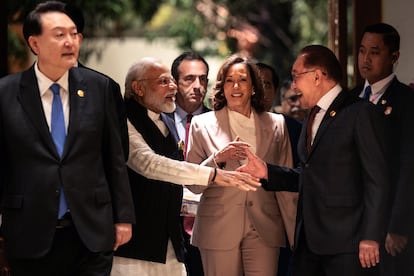As host of G-20 summit, India tests its new global role
New Delhi seeks to become a reference for the Global South as it gets closer to Washington. But tension with China will complicate a consensus this weekend

India will test its growing global role at the G-20 summit scheduled to be held this weekend in New Delhi. The strength of its economic growth, the success of its lunar mission, its demographic power and its profitable position as an essential partner for the U.S. and Europe in times of frayed relations with China have cemented India’s new presence on the international scene. A G-20 summit that is going to be very complicated, coming as it is in the midst of simmering tension, will portray how much influence India really has and test the viability of its multi-sided game to defend its best interests.
India continues to uphold its traditional mantra of non-alignment in foreign policy while pursuing with increasing conviction the goal of becoming a powerful and independent pole in a multipolar world. The nation’s most immediate and critical challenge is the fight with China, a rivalry that encompasses a range of issues such as territorial disputes, competition for influence in the region, Beijing’s support for Pakistan, and other sensitive factors. It is also in this perspective, and not only in terms of the deterioration of international relations, that the announced absence of Xi Jinping from the New Delhi summit, in addition to that of Vladimir Putin, must be viewed.
The difficulties in the preliminary negotiating work suggest that the possibility of the summit ending without a consensus statement is not a remote one. This would be a failure for the group as a whole, but the Indian presidency would certainly come away with its prestige in question. The tension between New Delhi and Beijing does not make things easier.
The tussle with China — which, like others in the modern world, goes hand in hand with a close economic relationship that is very important for India in its infrastructure and manufacturing development objectives — can be seen behind India’s main movements on the world stage: the attempt to set itself up as a spokesperson for the so-called Global South, New Delhi’s rapprochement with the U.S., and India’s position in the BRICS forum.
“As [PM] Narendra Modi and his foreign minister have said, India is aligned with its own interests. Chief among them is the desire to prevent China from becoming hegemonic in the region to such an extent that it prevents India from exercising its influence. This is key, and when you look at New Delhi’s relationship with the Global South, it should be seen substantially as an attempt to be more influential than China in that area,” says Frédéric Grare, a European Council on Foreign Relations Fellow who specializes in India. In that fight, China has the advantage of its greater economic power, but India can play with its position outside the Washington/Beijing dichotomy, which in political terms can be an advantage.

The effort to establish itself as a great representative of the Global South is the main key to reading the Indian presidency of the G-20. New Delhi has tried to push an agenda that, from debt restructuring to the design of global financial institutions, from climate change to food prices, largely takes the point of view of that broad group of countries.
On the other hand, New Delhi’s rapprochement with Washington because of common mistrust of the Chinese boom is gaining momentum. The movement is not new, but it has gained particular thrust under Modi, who recently made a new state visit to the U.S. in which he was granted the honor of addressing Congress for the second time, a distinction achieved by very few leaders in history. Modi returned home with major defense technology transfer deals under his belt.
“The rapprochement is not only with the U.S., but also with its European and Indo-Pacific allies,” says Eva Borreguero, a professor of political science at the Complutense University of Madrid who specializes in South East Asia.
The relationship with China also marks India’s position in the BRICS. This is a group that was born from the desire of emerging countries not aligned with the West that demanded a greater international political presence. Now, under pressure from Beijing, it has just taken steps to expand, while the antagonism towards the West has been growing within the group, from Russia and China, who are historical members, to the upcoming incorporation of Iran. “India does not share this feeling. Its movements within that group, even if they respond to their own logic, are in keeping with Western interests”, says Grare.
Grare notes that Indian foreign policy underwent a change after the collapse of the USSR, which was a major supplier of its weapons. The country continued to maintain a close relationship with Russia, which is one of the reasons why India did not condemn the invasion of Ukraine at the United Nations, but this relationship has become less and less relevant from a global perspective and it has not prevented Modi from launching critical messages against the Kremlin or endorsing a statement at last year’s G-20 summit that was uncomfortable for Moscow. After the collapse of the USSR, a rapprochement with the U.S. began to take shape and this expert sees a continuity, albeit with a more nationalist tone and the necessary adaptations due to the change in context, but without significant variations in substance.
Borreguero points out how the formal adherence to a non-alignment policy hides “underground” changes. “India has realized that this non-alignment did not serve to prevent wars with China and Pakistan. New Delhi is concerned about its security: without that security, its ability to address internal problems is diminished. And it is in this context that the construction of this new dense network of relations with the U.S. and several of its allies must be viewed, for example, through the QUAD [which brings together the U.S., India, Japan and Australia]”. This is not a formal alignment, much less a military alliance, but it is a significant membership in a dedicated forum that seeks to keep the Indo-Pacific “free and open,” a concept with strategic connotations of the highest caliber.
Another question is whether, and to what extent, the Hindu nationalism promoted internally by Modi and which is provoking a strong rejection from India’s Islamic minority will deteriorate India’s relations with a wide range of Muslim countries. “I don’t think this is having a significant impact,” Grare says. “I’m not saying it’s irrelevant, but it’s not that important, I don’t see this affecting international relations.”
All these factors will converge at the New Delhi summit, marking, for better or worse, the Indian presidency’s capacity for action in the search for consensus. As a senior European official noted, Indonesia, holder of the previous G-20 presidency, achieved a real feat at the Bali summit in 2022 by nailing a consensus statement in a tense global situation. This year’s event will offer important indications about the state of the world order, and India’s place in it.
Sign up for our weekly newsletter to get more English-language news coverage from EL PAÍS USA Edition
Tu suscripción se está usando en otro dispositivo
¿Quieres añadir otro usuario a tu suscripción?
Si continúas leyendo en este dispositivo, no se podrá leer en el otro.
FlechaTu suscripción se está usando en otro dispositivo y solo puedes acceder a EL PAÍS desde un dispositivo a la vez.
Si quieres compartir tu cuenta, cambia tu suscripción a la modalidad Premium, así podrás añadir otro usuario. Cada uno accederá con su propia cuenta de email, lo que os permitirá personalizar vuestra experiencia en EL PAÍS.
¿Tienes una suscripción de empresa? Accede aquí para contratar más cuentas.
En el caso de no saber quién está usando tu cuenta, te recomendamos cambiar tu contraseña aquí.
Si decides continuar compartiendo tu cuenta, este mensaje se mostrará en tu dispositivo y en el de la otra persona que está usando tu cuenta de forma indefinida, afectando a tu experiencia de lectura. Puedes consultar aquí los términos y condiciones de la suscripción digital.









































